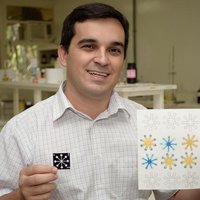Biotechnology & medicine
Maria Nunes Pereira
Patching holes in the hearts of sick infants.
Illustration by Sam Kerr

Global
Kathryn Whitehead
A systematic search discovered nanoparticles that could improve drug delivery.

Global
Kay Tye
Identifying how the connections between regions of the brain contribute to anxiety.

Latin America
Wendell Coltro
Has invented a low cost technology to manufacture paper-based, microfluidic analysis devices

Global
Rumi Chunara
Crucial information about disease outbreaks can be gleaned earlier.
